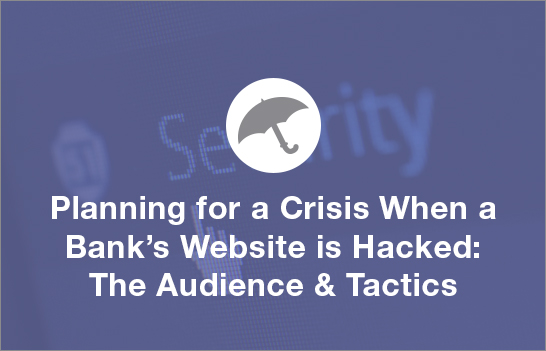In part four of this five-part series, Furia Rubel B2B Marketing and Public Relations CEO, Gina Rubel, discusses Planning for a Crisis When a Bank’s Website is Hacked: The Audience & Tactics. While the focus of the presentation is on community bank crisis management, the concepts apply across the board to all businesses and in particular law firms, accounting firms, financial service providers, nonprofits, municipalities and other business which should be concerned with website hacking and data breaches.
Below is a textual overview of the video.
Planning for a Crisis When a Bank’s Website is Hacked: The Audience & Tactics
Every crisis management plan (CMP) should include examples of a crisis (or incident) that would trigger the need to respond with crisis management. There are myriad examples of scenarios that businesses face today. Examples include everything from natural disasters to cybersecurity and website hacking. In this video, crisis management expert, Gina Rubel, addresses the audience and tactics a community bank needs to address in the event that the bank’s website is hacked.
Crisis Communications Audiences in the Event a Bank’s Website is Hacked
Internal: Ask, what needs to be handled internally. Think about the crisis response team, key executives, members of the board of directors, the IT department, security, employees and others.
Legal Team: Most likely, you need to involve your legal team both internally and externally. If your bank has a general counsel in-house, contact her first. If not, be sure to engage our outside corporate legal counsel from the very start.
External: Ask, who externally needs to know that the website was hacked. Think specifically about the bank’s customers and potentially the media, regulators, vendors, other third-parties, public relations agency, etc.
Crisis Communications Tactics to Consider in the Event a Bank’s Website is Hacked
Ask, which tactics will help you to effectively and efficiently communicate internally and externally? Consider the following:
- Containment Internally
- Public Statement (TV, radio, print, blog, social media, press conference, texts)
- Letter
- Traditional and Social Media
- Remain Silent?
With regard to remaining silent, Rubel’s favorite quote is that of Benjamin Franklin: “As we must account for every idle word, so must we account for every idle silence. Rubel also provided alternative language to “no comment.”
Saying “no comment” connotes guilt and creates the feelings of mistrust and suspicion that the person is trying to hide something. There are things you can say instead of “no comment.”
Three Media Statements in Instead of No Comment:
- We are aware of the situation and are working to gather the facts. We will share verified information publicly as soon as we are able.
- We appreciate your feedback. Hearing from our customers is important to us. The matter is under investigation. We will respond when we have more information.
- This matter is being investigated by our internal management teams. We are unable to provide more details at this time. Please provide us with your contact information and we will follow up with you as soon as we are able.
